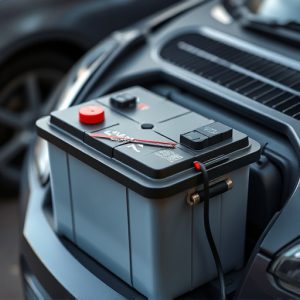If your vehicle struggles to start or performs poorly, a weak car battery could be the culprit. Look for signs like slow engine cranks, dim headlights, and unusual sounds when starting. Regularly test battery health by inspecting terminals for corrosion and ensuring tight connections. Pay attention to dashboard warning lights indicating electrical issues. Assess battery age, condition, and performance, especially in cold weather. Use a voltmeter to check voltage (12.6-12.8 volts) and inspect terminals for corrosion. Regular maintenance, including corrosion removal and terminal cleaning, extends battery life and prevents breakdowns. Consult a professional mechanic for safe handling and timely replacement if issues persist.
Is your car’s battery struggling to keep up? It might be time for a replacement. This article explores three key indicators that signal it’s beyond repair and you need a new car battery. From weak performance and warning lights on the dashboard to age and corrosion, we guide you through signs and steps to ensure a smooth transition. Learn how regular maintenance can prevent future issues and keep your vehicle running reliably. Discover when it’s time to say goodbye to your old battery and embrace a fresh, efficient power source.
- Check for Weak Battery Performance
- Observe Warning Lights on Dashboard
- Assess Battery Age and Corrosion
- Monitor Starting Difficulties
- Consider Electrical System Issues
- Evaluate Battery Test Results
- Plan Regular Battery Maintenance
Check for Weak Battery Performance
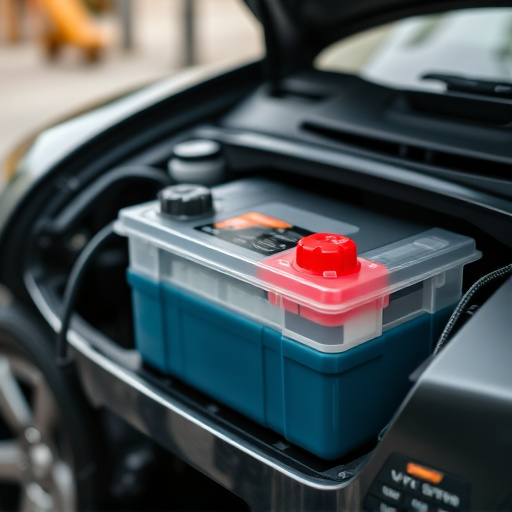
If your vehicle is struggling to start or shows signs of poor performance, it might be time to consider a replace car battery. A weak battery can lead to issues like a slow engine crank, dim headlights, and difficulty in starting the car. Pay attention to how your car behaves when you turn the key; if it takes longer than usual to start or makes unusual sounds, these could be indicators of a declining battery.
Regularly checking your battery’s health is crucial for preventing unexpected breakdowns. Simple tests like checking the battery terminals for corrosion or ensuring they’re tightly connected can help maintain optimal performance. Keep an eye on any leaks or swelling around the battery, as these are potential signs of damage that may require a replacement.
Observe Warning Lights on Dashboard

If your car’s dashboard starts lighting up with warning signals, it could be a clear indicator that your battery is reaching its end. Look out for lights flashing or illuminating symbols related to the electrical system, such as a battery icon or a lightning bolt. These warnings often appear when there’s an issue with your car’s charging system, which could be due to a weak or failing battery.
Paying attention to these visual cues is essential when considering a replace car battery operation. Ignoring them might lead to more serious problems, like leaving you stranded on the side of the road. It’s always best to consult a professional mechanic if you notice any unusual dashboard lights related to your car’s electrical components to ensure safe and timely battery replacement.
Assess Battery Age and Corrosion
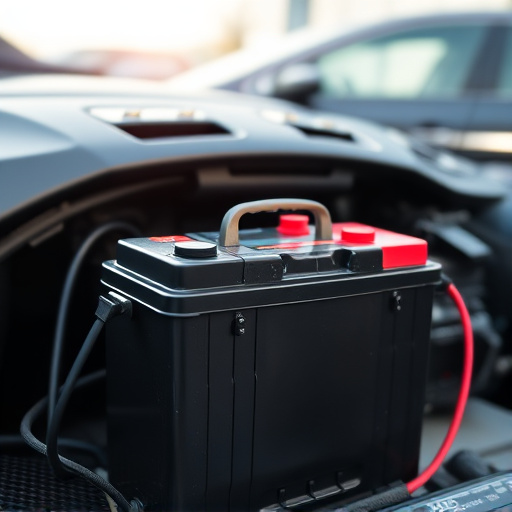
Assessing the age and condition of your car’s battery is a crucial step in determining if a replacement is needed. Over time, batteries can lose their efficiency due to natural wear and tear, especially in harsh environments with high temperatures or excessive moisture. Corrosion on the battery terminals is a clear sign that it’s seen better days; this buildup can insulate the connection, reducing power output and potentially causing starting issues.
When examining the battery, look for any signs of damage, leaks, or swelling. If it’s been in use for several years, there might be a build-up of corrosion that requires cleaning before making a decision to replace. Regular inspection and maintenance can help prolong the life of your car battery, ensuring smooth starts and avoiding unexpected breakdowns. Remember, a well-maintained battery is key to keeping your vehicle reliable on the road.
Monitor Starting Difficulties
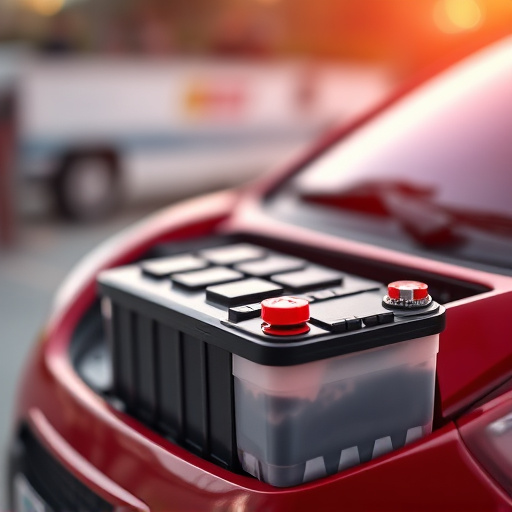
If your car struggles to start or requires multiple attempts, it could be an early sign that your battery is failing. Starting difficulties are often one of the first noticeable symptoms of a weak or aging battery. When a car battery can no longer provide enough power to turn over the engine, you may experience delays or even complete failure to start. Keep track of these instances, especially in cold weather conditions when battery performance tends to be lower.
Regular monitoring of your vehicle’s starting capabilities is an excellent way to predict when a replace car battery might be necessary. If you notice consistent issues with starting, it’s advisable to have your battery tested by a professional mechanic. They can assess the health of your battery and provide guidance on whether a replacement is required, ensuring your vehicle starts reliably and efficiently.
Consider Electrical System Issues
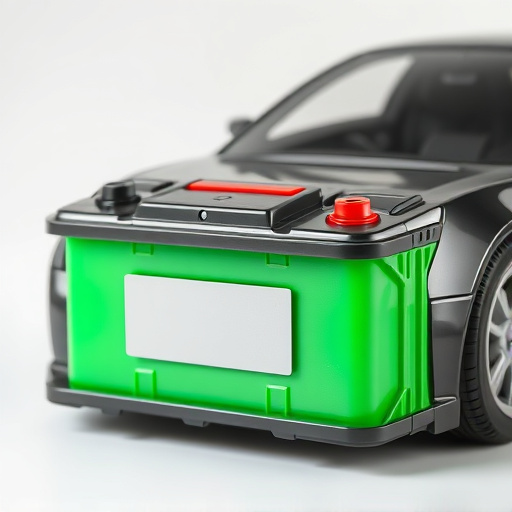
If your car’s electrical system is experiencing issues, it could be a sign that your battery needs replacing. Car batteries are responsible for powering various components such as lights, starters, and accessories. If you notice dim lighting, difficulty in starting the engine, or strange noises coming from the electrical system, these could be indicators of a weak or failing battery.
Regularly checking these signs is essential when considering a car battery replacement. Many modern vehicles rely heavily on electricity for comfort and safety features, so ensuring your battery is in top condition is crucial. By addressing electrical system problems promptly, you can avoid unexpected breakdowns and keep your vehicle running smoothly.
Evaluate Battery Test Results
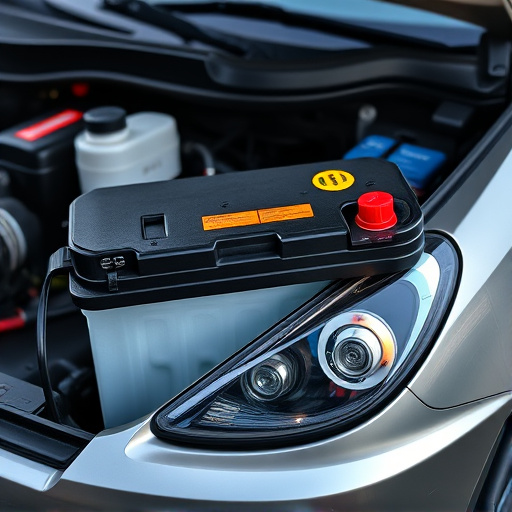
When evaluating whether it’s time for a replace car battery, pay close attention to the results of battery tests. A simple voltmeter check can provide valuable insights into your vehicle’s power source health. Typically, a fully charged 12-volt auto battery should read between 12.6 and 12.8 volts while idle. If the voltage drops below 12.4 volts, it might indicate a possible issue or impending failure.
Over time, as batteries degrade, their capacity to hold a charge diminishes. So, if test results consistently show lower voltage readings or if you’ve noticed frequent dead battery issues, it’s a clear sign that a replace car battery is necessary. Additionally, checking for corrosion on the battery terminals and cables can also help identify potential problems that may hinder optimal performance and further accelerate battery deterioration.
Plan Regular Battery Maintenance
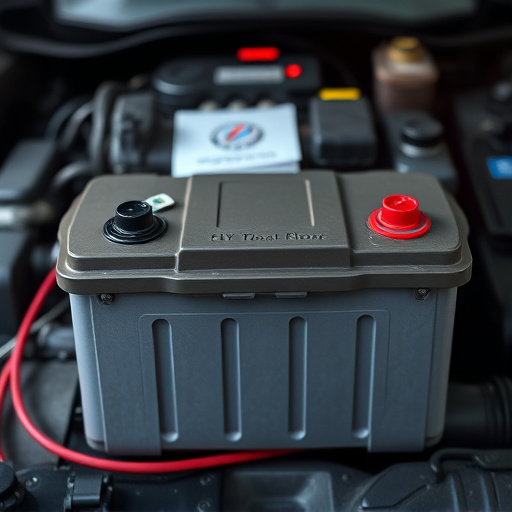
Regular battery maintenance is a crucial aspect of vehicle care that often goes overlooked until it’s too late. A car battery replacement should be part of your routine servicing to ensure optimal performance and avoid unexpected breakdowns. By planning regular check-ups, you can extend the lifespan of your battery and drive with peace of mind.
Start by inspecting the battery for any signs of corrosion or leaks at every service or during periodic checks. Corrosion build-up on the terminals is a common issue that can hinder electrical connection and reduce battery life. Clean the terminals with a specialized cleaner to ensure maximum conductivity, and remember, a well-maintained battery is less likely to need a premature replace car battery.
Knowing when to replace your car battery is crucial for maintaining reliable transportation. By closely monitoring weak performance, dashboard warning lights, signs of corrosion, starting difficulties, and electrical system issues, you can proactively ensure your vehicle’s longevity. Regular maintenance checks, including testing battery health, are key to avoiding unexpected failures. Remember, a well-maintained battery means smoother starts and fewer breakdowns, ensuring your car keeps running smoothly for years to come. Consider these indicators as your guide to replacing your car battery when needed.
